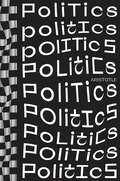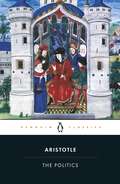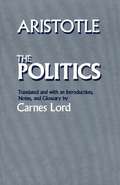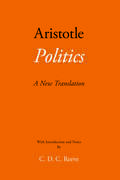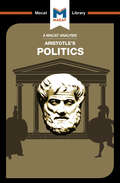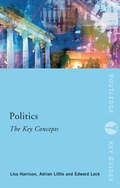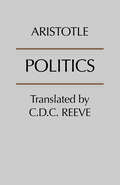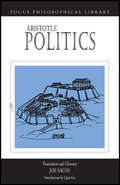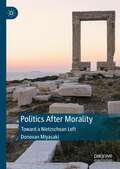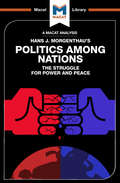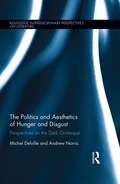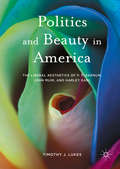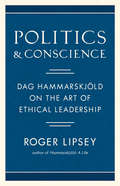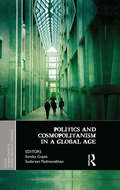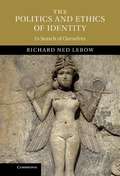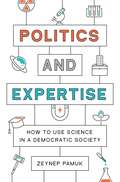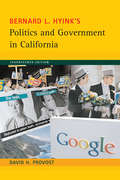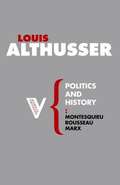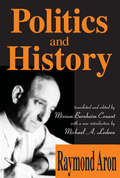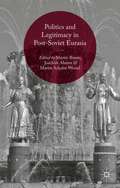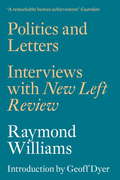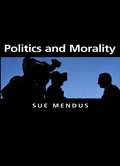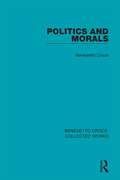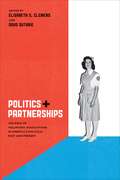- Table View
- List View
Politics
by AristotleA timeless study of politics and society by one of the all-time greatest thinkers.A student of Plato, Aristotle is considered a founding father of philosophy and ethics. This reflection on the role of government, and an individual's role within it, remains as prescient and relevant now as when it was written. One of the most influential books in history, Politics has influenced the greatest thinkers of the last 1,000 years and is a crucial book for those interested in evaluating the way our societies are structured.Part of a boldly designed series of classics, with wider margins for notes, this book is perfect for design-lovers and students alike. With bold, eye-catching graphic covers by Evi O Studio, this collection aims to introduce a selection of the most celebrated works of the last thousand years to a new audience. Featuring tales of adventure, fiction from the 19th and 20th centuries, feminist writings, and reflections on art, politics, philosophy and the origins of man, this is a small, wide-reaching and essential collection.'Man is naturally a political animal.'
Politics
by AristotleA timeless study of politics and society by one of the all-time greatest thinkers.A student of Plato, Aristotle is considered a founding father of philosophy and ethics. This reflection on the role of government, and an individual's role within it, remains as prescient and relevant now as when it was written. One of the most influential books in history, Politics has influenced the greatest thinkers of the last 1,000 years and is a crucial book for those interested in evaluating the way our societies are structured.Part of a boldly designed series of classics, with wider margins for notes, this book is perfect for design-lovers and students alike. With bold, eye-catching graphic covers by Evi O Studio, this collection aims to introduce a selection of the most celebrated works of the last thousand years to a new audience. Featuring tales of adventure, fiction from the 19th and 20th centuries, feminist writings, and reflections on art, politics, philosophy and the origins of man, this is a small, wide-reaching and essential collection.'Man is naturally a political animal.'
The Politics: Introduction To The Politics
by AristotleTwenty-three centuries after its compilation, 'The Politics' still has much to contribute to this central question of political science. Aristotle's thorough and carefully argued analysis is based on a study of over 150 city constitutions, covering a huge range of political issues in order to establish which types of constitution are best - both ideally and in particular circumstances - and how they may be maintained. Aristotle's opinions form an essential background to the thinking of philosophers such as Thomas Aquinas, Machiavelli and Jean Bodin and both his premises and arguments raise questions that are as relevant to modern society as they were to the ancient world.
Politics: A New Translation
by Aristotle C. D. ReeveThis new translation of Aristotle's Politics is a model of accuracy and consistency and fits seamlessly with the translator's Nicomachean Ethics, allowing the two to be read together, as Aristotle intended. Sequentially numbered endnotes provide the information most needed at each juncture, while a detailed Index of Terms indicates places where focused discussion of key notions occurs. A general Introduction prepares the reader for the work that lies ahead, explaining what sort of work it is and what sort of evidence it relies on.
Politics
by Katherine Berrisford Riley QuinnAristotle remains one of the most celebrated thinkers of all time in large part thanks to his incisive critical thinking skills. In Politics, which can be considered one of the foundational books of the western political tradition, the focus is on problem-solving, and particularly on the generation and evaluation of alternative possibilities Aristotle’s aim, in Politics, is to determine how best to organize a society. He looks in turn at several different type of organization – kingship, oligarchy and the polity, or rule in the hands of many – and evaluates the arguments for each in turn. But he takes the exercise further than his predecessors had done. Having concluded that rule by the aristocracy would be preferable, since it would mean rule by citizens capable of taking decisions on behalf of the society as a whole, Aristotle subjects his solution to a further checking process, asking productive questions in order to make a sound decision between alternatives. Politics was ground-breaking in its approach. Unlike previous thinkers, Aristotle based all his ideas on a practical assessment of how they would play out in the real world. Ultimately, Aristotle argues, the problem of self-interest means that the adoption of a mixed constitution – one based on carefully considered laws which aims at a balance of power between the people and the elite – is most likely to bring eudaemonia (happiness). It’s a conclusion firmly based on careful evaluation (not least the process of judging the adequacy of arguments) and the product of outstanding problem-solving skills.
Politics: The Key Concepts (Routledge Key Guides)
by Lisa Harrison Adrian Little Ed LockPolitics: The Key Concepts is an up-to-date and broad-ranging introduction to the terms that lie at the heart of political discourse. Entries are drawn from areas such as political theory, international politics, political science and methodology. As well as explaining core, established principles, this informative guide explores some of the more complex, topical and contested concepts from the world of politics. Concepts covered include: Capitalism Class Identity Institutionalism Referendum Marxism Pluralism Postmodernism Socialism Social Constructivism In an accessible A-Z format with helpful cross-referencing and suggestions for further reading, Politics: The Key Concepts is an invaluable reference for all students of politics, international relations and related courses.
Politics
by C. D. Reeve AristotleNo other English-language translation comes close to the standard of accuracy and readability set here by Reeve. This volume provides the reader with more of the resources needed to understand Aristotle's argument than any other edition. An introductory essay by Reeve situates Politics in Aristotle's overall thought and offers an engaging critical introduction to its central argument. A detailed glossary, footnotes, bibliography, and indexes provide historical background, analytical assistance with particular passages, and a guide both to Aristotle's philosophy and to scholarship on it.
Politics
by Joe Sachs Dr Lijun Gu AristotleThe Focus Philosophical Library's edition of Aristotle's Politics is a lucid and useful translation for the student of undergraduate philosophy, as well as for the general reader interested in the major works of western civilization. This edition includes an introductory essay, notes, glossary, and index, intending to provide the reader with some sense of the terms and the concepts as they were understood by Aristotle's immediate audience.Focus Philosophical Library books are distinguished by their commitment to faithful, clear, and consistent presentations of texts and the rich world part and parcel of those texts.
Politics After Morality: Toward a Nietzschean Left
by Donovan MiyasakiThis book completes the project, begun in Nietzsche’s Immoralism: Politics as First Philosophy, of critically reconstructing a Nietzschean left politics. Nietzsche's incompatibilist ideal of amor fati requires reconceiving legitimacy as the breeding of a people whose material conditions enable it to affirm its social order. Justice is founded in a future, higher type’s right to exist against present individuals who internalize the contradictions of past societies. In opposition to Nietzsche’s self-undermining aristocratism, this right can only be realized through a universal promotion of the pluralistic unity of the manifold soul, secured by an equally manifold form of democracy. Against the covert aristocratism of liberal proceduralism, authentic democracy produces a true people grounded in shared, concrete happiness, requiring a comprehensive egalitarianism maintained by a permanent socialist state and achievable only through a populist, coalitional politics across identities that radically transforms the material conditions of our shared social life.
Politics Among Nations
by Ramon Pacheco PardoHans Morgenthau’s Politics Among Nations is a classic of political science, built on the firm foundation of Morgenthau’s watertight reasoning skills. The central aim of reasoning is to construct a logical and persuasive argument that carefully organizes and supports its conclusions – often around a central concept or scheme of argumentation. Morgenthau’s subject was international relations – the way in which the world’s nations interact, and come into conflict or peace – a topic which was of vital importance during the unstable wake of the Second World War. To the complex problem of understanding the ways in which the post-war nations were jostling for power, Morgenthau brought a comprehensive schema: the concept of “realism” – or, in other words, the idea that every nation will act so as to maximise its own interests. From this basis, Morgenthau builds a systematic argument for a pragmatic approach to international relations in which nations seeking consensus should aim for a balance of power, grounding relations between states in understandings of how the interests of individual nations can be maximized. Though seismic shifts in international politics after the Cold War undeniably altered the landscape of international relations, Morgenthau’s dispassionate reasoning about the nature of our world remains influential to this day.
The Politics and Aesthetics of Hunger and Disgust: Perspectives on the Dark Grotesque (Routledge Interdisciplinary Perspectives on Literature)
by Michel Delville Andrew NorrisThis study examines how hunger narratives and performances contribute to a reconsideration of neglected or prohibited domains of thinking which only a full confrontation with the body’s heterogeneity and plasticity can reveal. From literary motif or psychosomatic symptom to revolutionary gesture or existential malady, the double crux of hunger and disgust is a powerful force which can define the experience of embodiment. Kafka’s fable of the "Hunger Artist" offers a matrix for the fast, while its surprising last-page revelation introduces disgust as a correlative of abstinence, conscious or otherwise. Grounded in Kristeva’s theory of abjection, the figure of the fraught body lurking at the heart of the negative grotesque gathers precision throughout this study, where it is employed in a widening series of contexts: suicide through overeating, starvation as self-performance or political resistance, the teratological versus the totalitarian, the anorexic harboring of death. In the process, writers and artists as diverse as Herman Melville, Percy Bysshe Shelley, Christina Rossetti, George Orwell, Knut Hamsun, J.M. Coetzee, Cindy Sherman, Pieter Breughel, Marina Abramovic, David Nebreda, Paul McCarthy, and others are brought into the discussion. By looking at the different acts of visceral, affective, and ideological resistance performed by the starving body, this book intensifies the relationship between hunger and disgust studies while offering insight into the modalities of the "dark grotesque" which inform the aesthetics and politics of hunger. It will be of value to anyone interested in the culture, politics, and subjectivity of embodiment, and scholars working within the fields of disgust studies, food studies, literary studies, cultural theory, and media studies.
Politics and Beauty in America
by Timothy J. J. LukesThis book holds classical liberalism responsible for an American concept of beauty that centers upon women, wilderness, and machines. For each of the three beauty components, a cultural entrepreneur supremely sensitive to liberalism's survival agenda is introduced. P. T. Barnum's exhibition of Jenny Lind is a masterful combination of female elegance and female potency in the subsistence realm. John Muir's Yosemite Valley is surely exquisite, but only after a rigorous liberal education prepares for its experience. And Harley Earl's 1955 Chevrolet Bel Air is a dreamy expressionist sculpture, but with a practical 265 cubic inch V-8 underneath. Not that American beauty has been uniformly pragmatic. The 1950s are reconsidered for having temporarily facilitated a relaxation of the liberal survival priorities, and the creations of painter Jackson Pollock and jazz virtuoso Ornette Coleman are evaluated for their resistance to the pressures of pragmatism. The author concludes with a provocative speculation regarding a future liberal habitat where Emerson's admonition to attach stars to wagons is rescinded.
Politics and Conscience: Dag Hammarskjold on the Art of Ethical Leadership
by Roger LipseyAn accessible guide to the principles and vision of Dag Hammarskjöld, a man John F. Kennedy called "the greatest statesman of our century."Dag Hammarskjöld served as Secretary-General of the United Nations from 1953 until his tragic Dag Hammarskjöld served as secretary-general of the United Nations from 1953 until his tragic death in a suspicious plane crash in 1961. During those years he saw the fledgling international organization through numerous crises with skill that made him a star on the international stage. As readers of his now-classic diary, Markings, are aware, Hammarskjöld understood political leadership as an honor calling for resourcefulness, humility, moral clarity, and spiritual reflection.In this accessible handbook, acclaimed biographer Roger Lipsey details the political and personal code by which Hammarskjöld lived and made critical decisions. What emerges is the portrait of a man who struck a remarkable balance between patience and action, empathy and reserve, policy and people. Structured through short sections on themes such as courage, facing facts, and negotiation, Politics and Conscience offers a vision of ethical leadership as relevant today as it was in Hammarskjöld&’s time.
Politics and Cosmopolitanism in a Global Age (Ethics, Human Rights and Global Political Thought)
by Sonika Gupta Sudarsan PadmanabhanThis book offers a unique reconceptualization of cosmopolitanism. It examines several themes that inform politics in a globalized era, including global governance, international law, citizenship, constitutionalism, community, domesticity, territory, sovereignty, and nationalism. The volume explores the specific philosophical and institutional challenges in constructing a cosmopolitan political community beyond the nation state. It reorients and decolonizes the boundaries of ‘cosmopolitanism’ and questions the contemporary discourse to posit inclusive alternatives. Presenting rich and diverse perspectives from across the world, the volume will interest scholars and students of politics and international relations, political theory, public policy, ethics, and philosophy.
The Politics and Ethics of Identity
by Richard Ned LebowWe are multiple, fragmented, and changing selves who, nevertheless, believe we have unique and consistent identities. What accounts for this illusion? Why has the problem of identity become so central in post-war scholarship, fiction, and the media? Following Hegel, Richard Ned Lebow contends that the defining psychological feature of modernity is the tension between our reflexive and social selves. To address this problem Westerners have developed four generic strategies of identity construction that are associated with four distinct political orientations. Lebow develops his arguments through comparative analysis of ancient and modern literary, philosophical, religious, and musical texts. He asks how we might come to terms with the fragmented and illusionary nature of our identities and explores some political and ethical implications of doing so.
Politics and Expertise: How to Use Science in a Democratic Society
by Zeynep PamukA new model for the relationship between science and democracy that spans policymaking, the funding and conduct of research, and our approach to new technologiesOur ability to act on some of the most pressing issues of our time, from pandemics and climate change to artificial intelligence and nuclear weapons, depends on knowledge provided by scientists and other experts. Meanwhile, contemporary political life is increasingly characterized by problematic responses to expertise, with denials of science on the one hand and complaints about the ignorance of the citizenry on the other.Politics and Expertise offers a new model for the relationship between science and democracy, rooted in the ways in which scientific knowledge and the political context of its use are imperfect. Zeynep Pamuk starts from the fact that science is uncertain, incomplete, and contested, and shows how scientists’ judgments about what is significant and useful shape the agenda and framing of political decisions. The challenge, Pamuk argues, is to ensure that democracies can expose and contest the assumptions and omissions of scientists, instead of choosing between wholesale acceptance or rejection of expertise. To this end, she argues for institutions that support scientific dissent, proposes an adversarial “science court” to facilitate the public scrutiny of science, reimagines structures for funding scientific research, and provocatively suggests restricting research into dangerous new technologies.Through rigorous philosophical analysis and fascinating examples, Politics and Expertise moves the conversation beyond the dichotomy between technocracy and populism and develops a better answer for how to govern and use science democratically.
Politics and Government in California
by Bernard Hyink David ProvostPolitics and Government in California is an even-handed, comprehensive account of the organization and function of California state and local governments.Focusing on how state and local governments can most effectively address the challenges facing California today, the Seventeenth Edition is thoroughly updated to include the most recent data and events.
Politics and History: Montesquieu, Rousseau, Marx
by Louis Althusser Ben BrewsterIn the first two essays of this book, Louis Althusser analyses the work of two of the greatest thinkers of the Enlightenment – Montesquieu and Rousseau. He shows that although they made considerable advances towards establishing a science of politics, particularly in comparison with the theorists of natural law, they nevertheless remained the victims of the ideologies of their day and class. Montesquieu accepted as given the political notions current in French absolutism; Rousseau attempted to impose by moral conversion an already outdated mode of production. The third essay examines Marx's relationship to Hegel and elaborates on the discussions of this theme in Althusser's earlier books, For Marx and Lenin and Philosophy. Althusser argues that Marx was able to establish a theory of historical materialism and the possibility of a Marxist philosophy of dialectical materialism not simply by turning his back on Hegel, but by extracting and converting certain categories from Hegel's Logic and applying them to English political economy and French socialist political theory.
Politics and History
by Ron ChristensonRaymond Aron, French scholar, journalist, philosopher, sociologist, and historian, is internationally recognized as one of the great thinkers in the modern social sciences, bringing to contemporary history the insights of both philosophy and social science. This edition focuses on Aron's lifelong attempt to bridge the gap between knowledge and action and to understand the dialectical relationship between history and politics. It is an indispensable introduction to one of the most important thinkers of our century.This volume also contains an introduction by Aron, which presents an autobiographical account of his confrontation with many of the most important ideas of this century. Miriam Bernheim Conant provides perceptive commentary as well as a chronology of Aron's career and works.
Politics and Legitimacy in Post-Soviet Eurasia
by Martin Brusis Joachim Ahrens Martin Schulze WesselPolitical legitimacy has become a scarce resource in Russia and other post-Soviet states. Their capacity to deliver prosperity has suffered from economic crisis, war in Ukraine and confrontation with the West. Will nationalism and repression enable political regimes to survive? This book studies the politics of legitimation in Post-Soviet Eurasia.
Politics and Letters
by Raymond Williams Geoff DyerRaymond Williams made a central contribution to the intellectual culture of the Left in the English-speaking world. He was also one of the key figures in the foundation of cultural studies in Britain, which turned critical skills honed on textual analysis to the examination of structures and forms of resistance apparent in everyday life. Politics and Letters is a volume of interviews with Williams, conducted by New Left Review, designed to bring into clear focus the major theoretical and political issues posed by his work. Introduced by writer Geoff Dyer, Politics and Letters ranges across Williams's biographical development, the evolution of his cultural theory and literary criticism, his work on dramatic forms and his fiction, and an exploration of British and international politics.From the Trade Paperback edition.
Politics and Morality
by Susan MendusPublic disenchantment with politics has become a key feature of the world in which we live. In this book, Susan Mendus asks if politicians can be morally good or whether politics is destined to involve dirty hands or the loss of integrity, as many modern philosophers claim.
Politics and Morals (Collected Works)
by Benedetto CroceOriginally published in 1946, this book reveals Croce’s dynamic conception of liberty, liberalism and the relation of individual morality to the State. The State which he discusses is more than a national government; it is a historical conception which takes in all ‘states’ - local and international. The volume provides an inspired analysis of the relation of politics and morals, individual liberty, free enterprise and pragmatic social judgement.
Politics and Partnerships: The Role of Voluntary Associations in America's Political Past and Present
by Elisabeth S. Clemens Doug GuthrieExhorting people to volunteer is part of the everyday vocabulary of American politics. Routinely, members of both major parties call for partnerships between government and nonprofit organizations. These entreaties increase dramatically during times of crisis, and the voluntary efforts of ordinary citizens are now seen as a necessary supplement to government intervention. But despite the ubiquity of the idea of volunteerism in public policy debates, analysis of its role in American governance has been fragmented. Bringing together a diverse set of disciplinary approaches, Politics and Partnerships is a thorough examination of the place of voluntary associations in political history and an astute investigation into contemporary experiments in reshaping that role. The essays here reveal the key role nonprofits have played in the evolution of both the workplace and welfare and illuminate the way that government’s retreat from welfare has radically altered the relationship between nonprofits and corporations.
